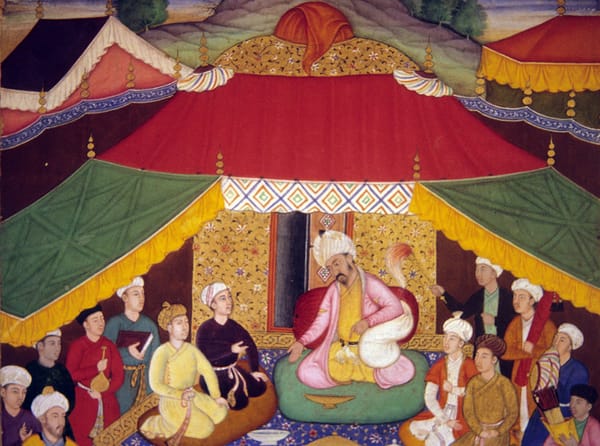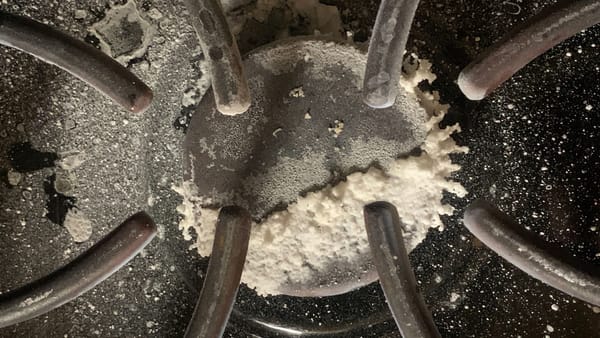Chris Rufo, assignment editor
Indignity Vol. 4, No. 67
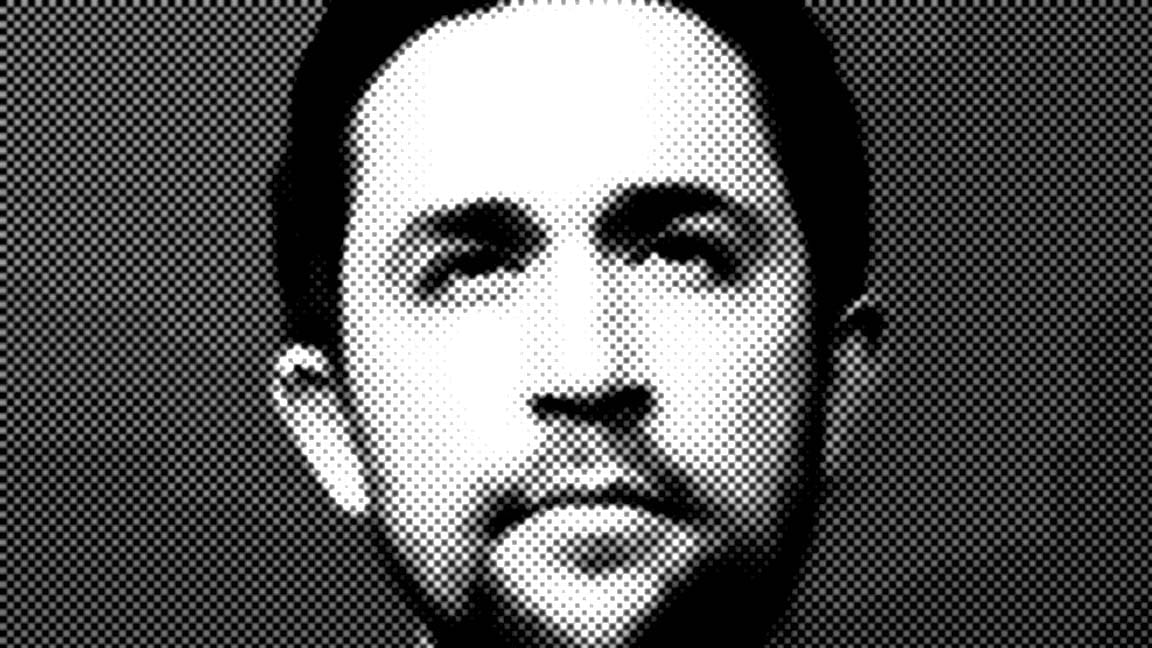
The New York Times Manufactures a Scandal
THE WORST THING WE READ™
HOW DOES A media organization get into trouble? The New York Times published a story this week about National Public Radio:
Katherine Maher, the chief executive of NPR, is facing online criticism for years-old social media posts criticizing former President Donald J. Trump and embracing liberal causes.
The posts, published on the social media platform Twitter, which is now called X, were written before she was named chief executive of NPR in January. They resurfaced this week after an essay by an NPR staff member who argued that the broadcaster’s leaders had allowed liberal bias to taint its coverage.
Here, right away, was an object repackaged as an active subject. The news was not that NPR's chief executive was facing criticism, it was that someone had criticized NPR's chief executive. A person took an action, without which there would have been no story, and yet the Times chose not to focus the story on that person. Old tweets—inanimate items of data, sitting in a database—had "resurfaced," apparently on their own.
The age of the tweets generally would have disqualified them from being news, but the Times was deriving the tweets' news value from a recent event, the publication of a complaint about liberal bias at NPR. What was the relationship between those two things? The Times spackled it over with "after," the word journalists use when they can't, or don't want to, specify a cause-and-effect relationship.
What was it that the Times was straining so hard not to tell the reader? Somehow, under the headline "NPR C.E.O. Faces Criticism Over Tweets Supporting Progressive Causes," the story could not bring itself to narrate how that criticism had happened. Fourteen paragraphs went by before the critic—the person responsible for the article existing at all—finally appeared.
"Christopher Rufo, a fellow at the conservative Manhattan Institute, called attention to many of Ms. Maher’s posts on X," the fifteenth paragraph began. This was a remarkably limited and uninformative way of describing Rufo; in the context of the story, it might have been more helpful for the Times to explain that he is the organizer of an ongoing series of right-wing scandal-manufacturing campaigns, designed to force liberal, or liberal-coded, institutions to fire people in the most embarrassing ways available.
For instance, it was Rufo who set out to get Harvard's last president, Claudine Gay, removed—first by accusing her of not caring enough about anti-Semitism, then, when that stalled out for lack of merit, by charging her with plagiarism. In that effort, Rufo enjoyed two major allies. One was the logorrheic financier Bill Ackman, who saw an attack on a Black woman who was Harvard president as a chance to grind axes against both Harvard as an institution and employment diversity as a fact of life. The other ally, day after day, was the New York Times, which unloaded full-bore crisis-and-scandal coverage onto Gay until that coverage made itself come true.
And now the Times was doing Rufo's work for him again, writing about a scandal that only rated as a scandal to the extent that the Times was writing about it. Consider the subheadline of the story about NPR:
Katherine Maher, who took over the public network last month, posted years ago on Twitter that “Donald Trump is a racist.”
The headline package is where you try to make the case that a story matters. "Years ago" is not usually a thing you want to put in there, in a daily newspaper, especially not juxtaposed with "last month." As the Times wrote:
An NPR spokeswoman, Isabel Lara, said in a statement that Ms. Maher “was not working in journalism at the time and was exercising her First Amendment right to express herself like any other American citizen.”
A judicious editor, reading that passage, might have recognized it as a pretty solid argument against running the story. If Maher didn't write the tweets when she was in charge of NPR, or even when she was working as a journalist, then half of the putative news value of the story goes away.
The other half of the news value went away with the revelation that the spiciest tweet at issue read "Also, Donald Trump is a racist." That Donald Trump is a racist is simply a true fact; the Times allows its own employees to say Donald Trump is a racist, in those words, in print. Why was it worth writing about someone tweeting that same thing?
The answer—the sole and complete answer—is that it was worth writing about because a partisan crusader wanted the Times to write about it. The deference to Rufo was so complete that the framing device in the headline, "Faces Criticism," was the same device the Times uses in everyday newswriting to conceal its own hand: attributing this or that rude fact, or accusation of wrongdoing, to the voice of vaporous "critics."
In this case, though, the point was to muffle the voice of a very specific critic, on a very specific campaign. It's NPR's turn to take a beating, and so the Times took up whatever stick was handed to it. Or sticks, plural. On its long way to getting to Rufo, the Times story turned to Uri Berliner, the now-former NPR editor who'd criticized the network's liberalism. Berliner's story ran in the Free Press, the well-publicized complaint-culture journal run by the former Times opinion staffer Bari Weiss (a pioneer of the maneuver that Berliner pulled today, quitting one's job and then declaring oneself a victim of canceling).
As the Times put it:
Much of the discussion about the posts has emanated from conservative critics after the publication of an opinion column in The Free Press, a popular Substack publication. In the column, Uri Berliner, a senior business editor at NPR, said that “people at every level of NPR have comfortably coalesced around the progressive worldview.”
There was that sneaky "after" again! Maher has been at NPR for a month. What do her old Twitter posts have to do with Berliner's long-gathered list of grievances and grudges from before she ever got there? What did plagiarism have to do with anti-Semitism? They were all just different tennis balls for Rufo to throw, secure in the knowledge that the dog would chase them. By now, it all reads as if, in addition to trying to cost his targets their jobs, Rufo is running a meta-campaign to see how low he can drive the newswriting standards at the Times. Once Rufo finally showed up in the story as the person pushing the tweet controversy, the Times added that he had:
shared a response from Tesla’s chief executive, Elon Musk, who had responded to one of Ms. Maher’s posts that Mr. Rufo highlighted, saying, “This person is a crazy racist!”
“If NPR wants to truly be National Public Radio, it can’t pander to the furthest-left elements in the United States,” Mr. Rufo said in an interview. “To do so, NPR should part ways with Katherine Maher.”
Elon Musk, the world's most prominent promoter of neo-Nazi propaganda, was calling someone else "a crazy racist," and the Times was printing his words without context or explanation—not even a quote of the text the post Musk was responding to, let alone comment from the person being accused of being crazy and racist.
And then the Times handed its megaphone directly to Rufo, so he could call Maher's tweets—which were entirely mainstream pro-Democratic Party cringeposting—examples of "the furthest-left elements in the United States." With that claim unchallenged, Rufo could then use the Times to formally demand that Maher lose her job. The journalistic crisis was spinning out of control. And not the one at NPR.

WEATHER REVIEWS
New York City, April 16, 2024
★★★★★ A sunbeam cut into the bedroom, after a night of dream-stirring breezes, making the opaque plastic rod of the blinds look like Lucite as it passed. A quadrotor drone, steered inexpertly by someone on a high-floor apartment terrace, buzzed and lurched against the clear blue. Silver flashed along an airplane crossing high above it. One crow peeled off from a passing group to circle the drone. The street trees were scattering light and casting dappled shadow. The breeze scooped up pear petals from where they'd come to rest in the corner of a tree box and sent them spinning further along the sidewalk, a new moment of possibility before the time came to finally settle into soil or gutter. Here, finally, was the harmonious interplay between cool air and warm sun, each pleasant sensation taking over from the other in turn on the half-mile walk to get vegetables—and the extra block and a half for paper and pencil leads—and the block past that for a loaf of bread, too. Back home, on the corner, the cherry blossoms were as thick and sturdy as chrysanthemums.

EASY LISTENING DEP'T.
This first rectangle, below, is the podcast file right here on GHOST. If you are reading this in your web browser, you can just stay right here and click that sideways black triangle and listen to six minutes and 29 seconds of podcast. HOWEVER, we have learned that if you are enjoying this post in an email, when you click on the triangle you will be taken to the web version of this post, and then you can find and click on the triangle and it will play. Let us know!
This next rectangle delivers you to the mighty podcast.indignity.net and all the episodes of INDIGNITY MORNING PODCAST. It works!
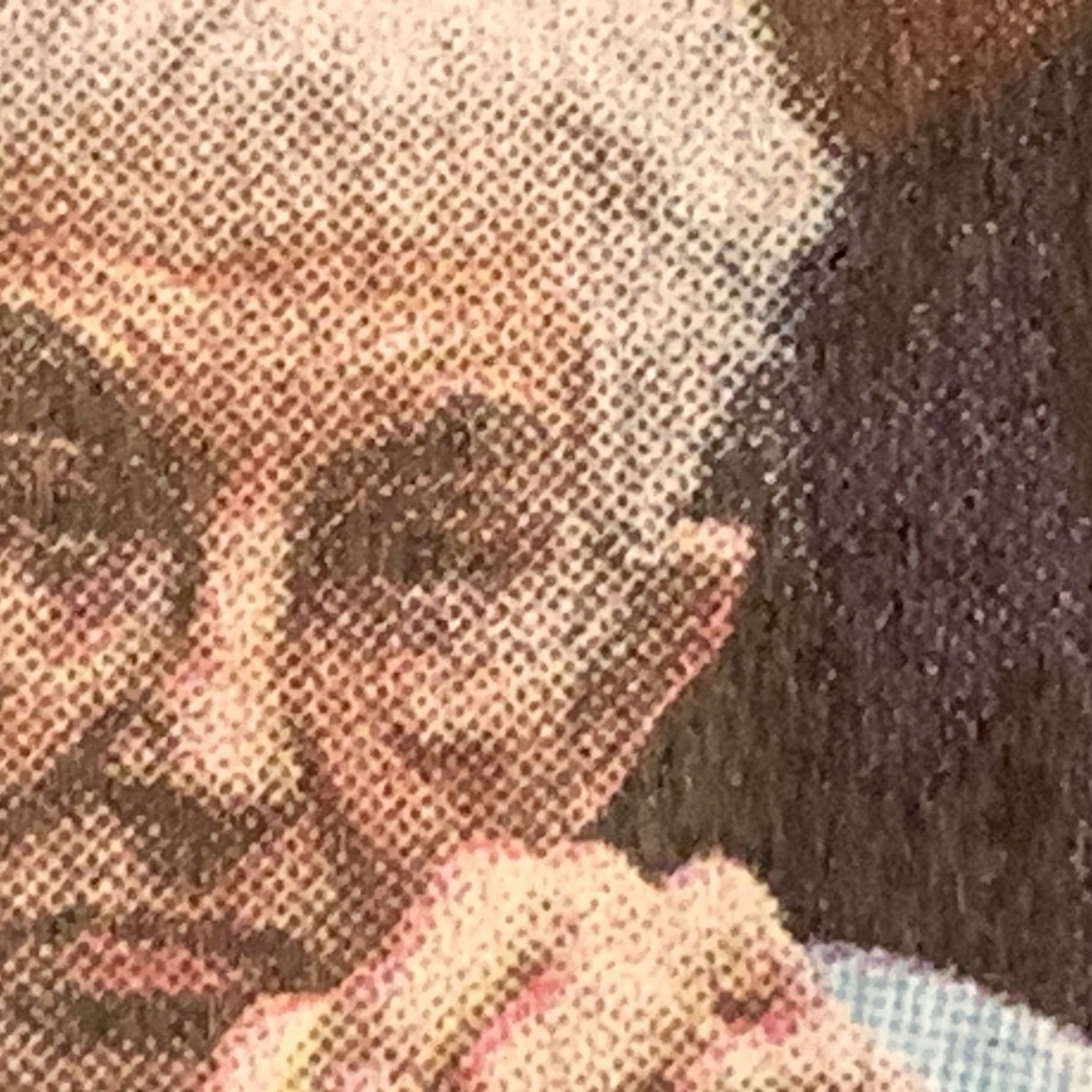
Visit podcast.indignity.net for the RSS thing and Apple stuff, and the podcast is now also working in Spotify:
Let us know at indignity@indignity.net if you encounter difficulties with the links. We're still trying to see what works! Thank you for trying to listen! Podcast!

SANDWICH RECIPES DEP’T.
WE PRESENT INSTRUCTIONS in aid of the assembly of sandwiches from New Presentation of Cooking with Timed Recipes, by Auguste Gay with the collaboration of Anne Page. Published in 1924, and now in the Public Domain and available at archive.org for the delectation of all.
STRAWBERRY WATERCRESS SANDWICH
For each sandwich
2 slices of buttered bread
2 tablespoons watercress, chopped
10 strawberries, cut in halves
Spread the chopped watercress on both slices of bread. Arrange on each slice the strawberries. Place one slice on top of the other and press lightly.
TOMATO AND FIG SANDWICH
For each sandwich
2 slices of buttered bread
2 slices of tomato
3 dry figs
Chop the figs fine. Spread on both slices of bread. Place slices of tomato on one slice of bread. Cover with the other slice.
If you decide to prepare and attempt to enjoy a sandwich inspired by this offering, be sure to send a picture to indignity@indignity.net.

MARKETING DEP'T.
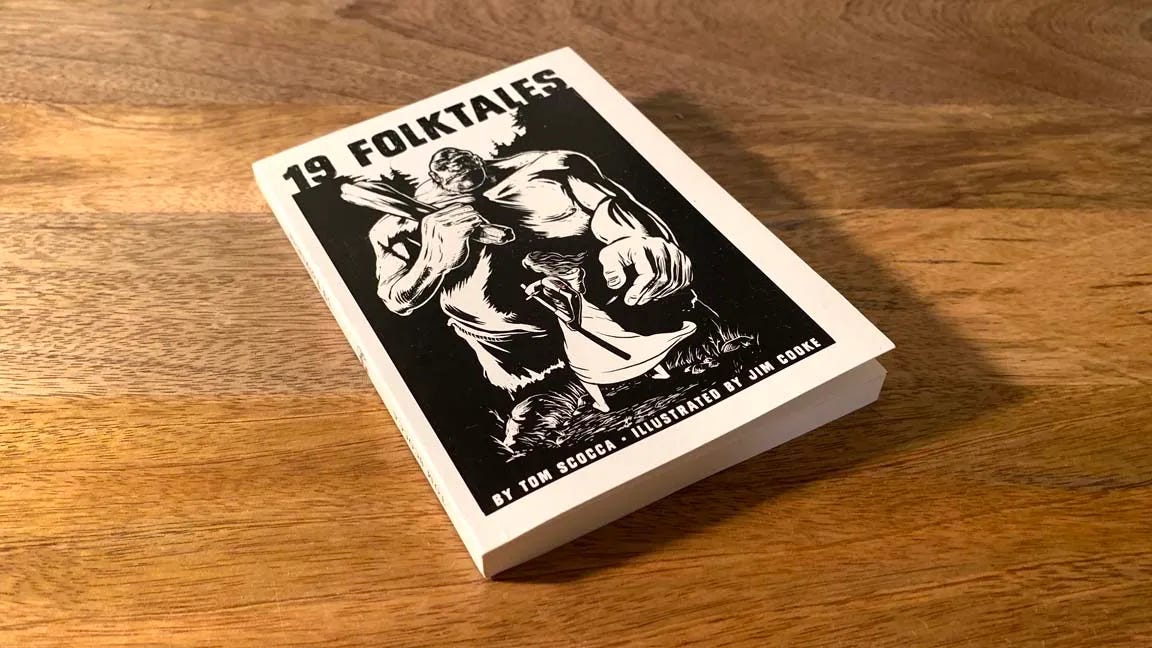
The second printing of 19 FOLK TALES is now available for gift-giving and personal perusal! Sit in the strengthening sunshine with a breezy collection of stories, each of which is concise enough to read before the damp ground seeps through your blanket.
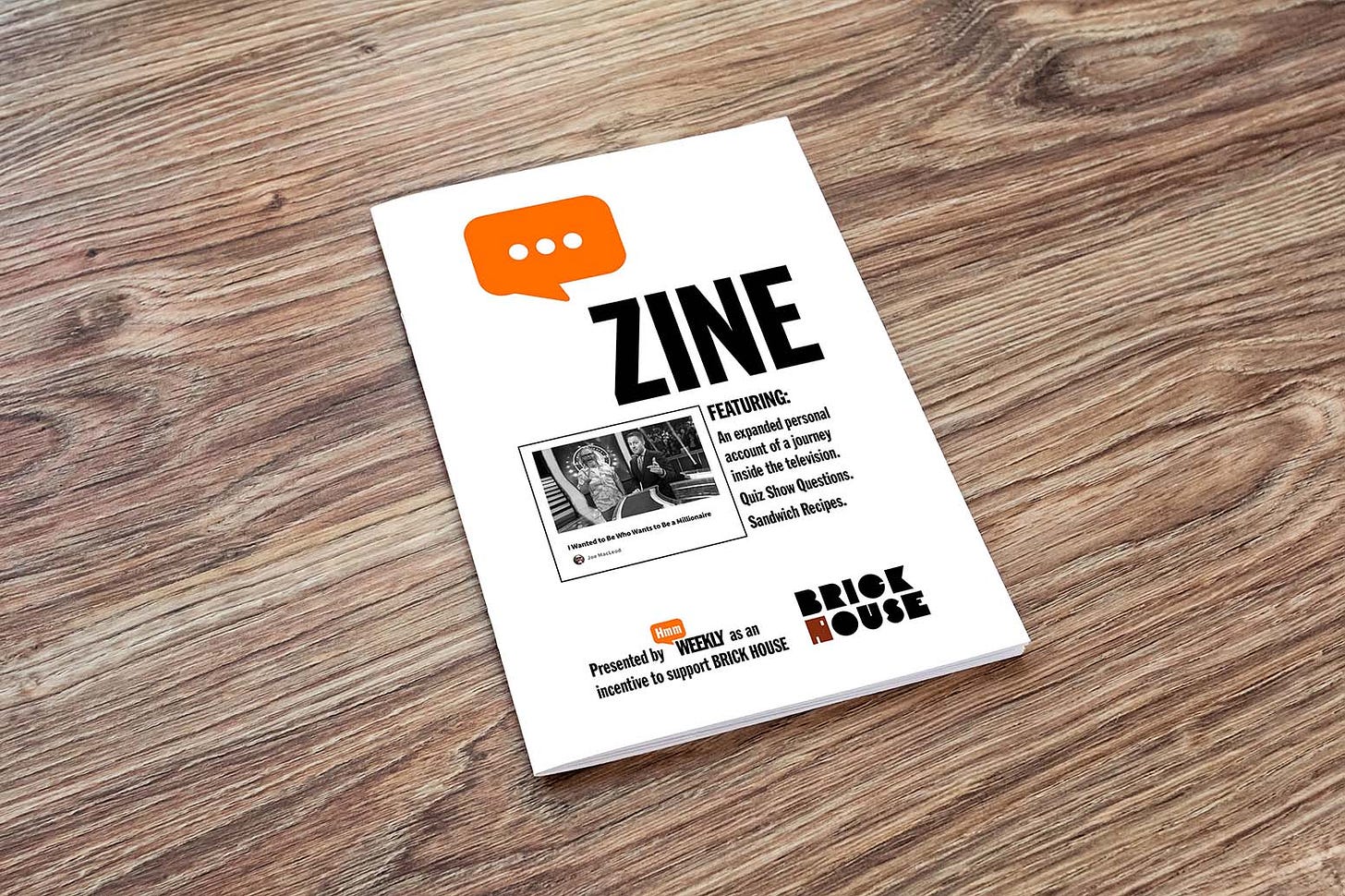
HMM WEEKLY MINI-ZINE, Subject: GAME SHOW, Joe MacLeod’s account of his Total Experience of a Journey Into Television, expanded from the original published account found here at Hmm Daily. The special MINI ZINE features other viewpoints related to an appearance on, at, and inside the teevee game show Who Wants to Be A Millionaire, available for purchase at SHOPULA.


